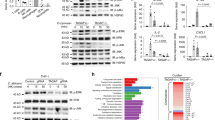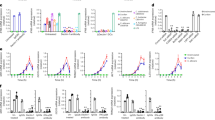Abstract
Fungal infections are increasing worldwide due to the marked rise in immunodeficiencies including AIDS; however, immune responses to fungi are poorly understood. Dectin-1 is the major mammalian pattern recognition receptor for the fungal component zymosan. Dectin-1 represents the prototype of innate non-Toll-like receptors (TLRs) containing immunoreceptor tyrosine-based activation motifs (ITAMs) related to those of adaptive antigen receptors. Here we identify Card9 as a key transducer of Dectin-1 signalling. Although being dispensable for TLR/MyD88-induced responses, Card9 controls Dectin-1-mediated myeloid cell activation, cytokine production and innate anti-fungal immunity. Card9 couples to Bcl10 and regulates Bcl10–Malt1-mediated NF-κB activation induced by zymosan. Yet, Card9 is dispensable for antigen receptor signalling that uses Carma1 as a link to Bcl10–Malt1. Thus, our results define a novel innate immune pathway and indicate that evolutionarily distinct ITAM receptors in innate and adaptive immune cells use diverse adaptor proteins to engage selectively the conserved Bcl10–Malt1 module.
This is a preview of subscription content, access via your institution
Access options
Subscribe to this journal
Receive 51 print issues and online access
$199.00 per year
only $3.90 per issue
Buy this article
- Purchase on Springer Link
- Instant access to full article PDF
Prices may be subject to local taxes which are calculated during checkout





Similar content being viewed by others
References
Akira, S. & Takeda, K. Toll-like receptor signalling. Nature Rev. Immunol. 4, 499–511 (2004)
Gordon, S. Pattern recognition receptors: doubling up for the innate immune response. Cell 111, 927–930 (2002)
Inohara, N. & Nunez, G. NODs: intracellular proteins involved in inflammation and apoptosis. Nature Rev. Immunol. 3, 371–382 (2003)
Lin, X. & Wang, D. The roles of CARMA1, Bcl10, and MALT1 in antigen receptor signaling. Semin. Immunol. 16, 429–435 (2004)
Bonizzi, G. & Karin, M. The two NF-κB activation pathways and their role in innate and adaptive immunity. Trends Immunol. 25, 280–288 (2004)
Thome, M. CARMA1, BCL-10 and MALT1 in lymphocyte development and activation. Nature Rev. Immunol. 4, 348–359 (2004)
Bertin, J. et al. CARD9 is a novel caspase recruitment domain-containing protein that interacts with BCL10/CLAP and activates NF-κB. J. Biol. Chem. 275, 41082–41086 (2000)
Matsumoto, R. et al. Phosphorylation of CARMA1 plays a critical role in T Cell receptor-mediated NF-κB activation. Immunity 23, 575–585 (2005)
Sommer, K. et al. Phosphorylation of the CARMA1 linker controls NF-κB activation. Immunity 23, 561–574 (2005)
Thome, M. & Tschopp, J. TCR-induced NF-κB activation: a crucial role for Carma1, Bcl10 and MALT1. Trends Immunol. 24, 419–424 (2003)
Di Carlo, F. J. & Fiore, J. V. On the composition of zymosan. Science 127, 756–757 (1958)
Brown, G. D. & Gordon, S. Immune recognition. A new receptor for β-glucans. Nature 413, 36–37 (2001)
Underhill, D. M. et al. The Toll-like receptor 2 is recruited to macrophage phagosomes and discriminates between pathogens. Nature 401, 811–815 (1999)
Brown, G. D. & Gordon, S. Fungal β-glucans and mammalian immunity. Immunity 19, 311–315 (2003)
Villamon, E. et al. Toll-like receptor-2 is essential in murine defenses against Candida albicans infections. Microbes Infect. 6, 1–7 (2004)
Gantner, B. N., Simmons, R. M., Canavera, S. J., Akira, S. & Underhill, D. M. Collaborative induction of inflammatory responses by dectin-1 and Toll-like receptor 2. J. Exp. Med. 197, 1107–1117 (2003)
Rogers, N. C. et al. Syk-dependent cytokine induction by Dectin-1 reveals a novel pattern recognition pathway for C type lectins. Immunity 22, 507–517 (2005)
Brown, G. D. et al. Dectin-1 mediates the biological effects of β-glucans. J. Exp. Med. 197, 1119–1124 (2003)
Brown, G. D. Dectin-1: a signalling non-TLR pattern-recognition receptor. Nature Rev. Immunol. 6, 33–43 (2005)
Takeuchi, O. et al. Differential roles of TLR2 and TLR4 in recognition of gram-negative and gram-positive bacterial cell wall components. Immunity 11, 443–451 (1999)
Aliprantis, A. O. et al. Cell activation and apoptosis by bacterial lipoproteins through toll-like receptor-2. Science 285, 736–739 (1999)
Takeuchi, O., Hoshino, K. & Akira, S. Cutting edge: TLR2-deficient and MyD88-deficient mice are highly susceptible to Staphylococcus aureus infection. J. Immunol. 165, 5392–5396 (2000)
Kawai, T., Adachi, O., Ogawa, T., Takeda, K. & Akira, S. Unresponsiveness of MyD88-deficient mice to endotoxin. Immunity 11, 115–122 (1999)
Ruland, J. et al. Bcl10 is a positive regulator of antigen receptor-induced activation of NF-κB and neural tube closure. Cell 104, 33–42 (2001)
McAllister-Lucas, L. M. et al. Bimp1, a MAGUK family member linking protein kinase C activation to Bcl10-mediated NF-κB induction. J. Biol. Chem. 276, 30589–30597 (2001)
Eliopoulos, A. G., Das, S. & Tsichlis, P. N. The tyrosine kinase Syk regulates TPL2 activation signals. J. Biol. Chem. 281, 1371–1380 (2006)
Ruland, J., Duncan, G. S., Wakeham, A. & Mak, T. W. Differential requirement for Malt1 in T and B cell antigen receptor signaling. Immunity 19, 749–758 (2003)
Klemm, S. et al. The Bcl10-Malt1 complex segregates FcɛRI-mediated nuclear factor κB activation and cytokine production from mast cell degranulation. J. Exp. Med. 203, 337–347 (2006)
Hammer, M. et al. Control of dual-specificity phosphatase-1 expression in activated macrophages by IL-10. Eur. J. Immunol. 35, 2991–3001 (2005)
Sparwasser, T. et al. Bacterial DNA and immunostimulatory CpG oligonucleotides trigger maturation and activation of murine dendritic cells. Eur. J. Immunol. 28, 2045–2054 (1998)
Acknowledgements
We thank H. Wagner, R. Lang, R. Rupec and M. Thome for discussions; S. Bauer and K. Pechloff for critically reading the manuscript; B. Holzmann for providing Myd88-/- bone marrow; A. Walch for access to a confocal microscope; M. Neuenhahn for help with intravenous injections; and S. Weiss, S. Leeder and K. Meiners for technical assistance. This work was supported by SFB grants from Deutsche Forschungsgemeinschaft to I.F. and J.R. and by a Max-Eder-Program grant from Deutsche Krebshilfe to J.R.
Author information
Authors and Affiliations
Corresponding author
Ethics declarations
Competing interests
Reprints and permissions information is available at npg.nature.com/reprintsandpermissions. The authors declare no competing financial interests.
Supplementary information
Supplementary Figures
This file contains Supplementary Figures 1–3. Supplementary Figure 1 details generation of Card9 deficient mice. Supplementary Figure 2 details FACS analysis of lymphocyte development. Supplementary Figure 3 details Bcl10 and Malt1 control Candida albicans induced cytokine production and zymosan induced NF-κB activation. (PDF 5461 kb)
Supplementary Methods
This file contains a more detailed description of the methods used in this study. (PDF 111 kb)
Rights and permissions
About this article
Cite this article
Gross, O., Gewies, A., Finger, K. et al. Card9 controls a non-TLR signalling pathway for innate anti-fungal immunity. Nature 442, 651–656 (2006). https://doi.org/10.1038/nature04926
Received:
Accepted:
Published:
Issue Date:
DOI: https://doi.org/10.1038/nature04926
This article is cited by
-
Lower myostatin and higher MUC1 levels are associated with better response to mepolizumab and omalizumab in asthma: a protein–protein interaction analyses
Respiratory Research (2023)
-
Macrophage CARD9 mediates cardiac injury following myocardial infarction through regulation of lipocalin 2 expression
Signal Transduction and Targeted Therapy (2023)
-
IgA nephropathy
Nature Reviews Disease Primers (2023)
-
Macrophage Dectin-1 mediates Ang II renal injury through neutrophil migration and TGF-β1 secretion
Cellular and Molecular Life Sciences (2023)
-
Card9 protects sepsis by regulating Ripk2-mediated activation of NLRP3 inflammasome in macrophages
Cell Death & Disease (2022)
Comments
By submitting a comment you agree to abide by our Terms and Community Guidelines. If you find something abusive or that does not comply with our terms or guidelines please flag it as inappropriate.



